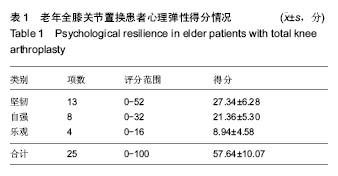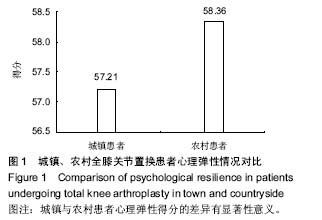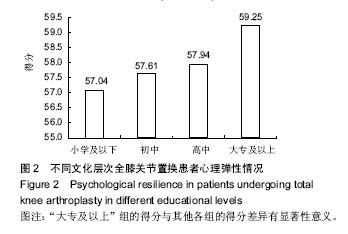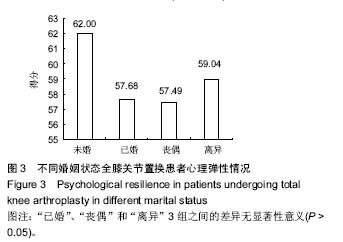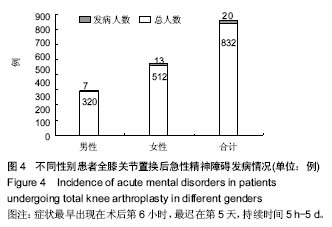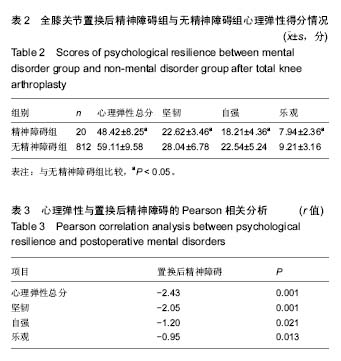| [1] 刘元昆,尹宗生.单侧与同期双侧膝关节置换的安全性、经济性及成效性对比[J]. 中国组织工程研究, 2016,20(13):1829-1837.[2] Wagnild GM,Young HM.Development and psychometric evaluation of the Resilience Scale.J Nurs Meas.1993; 1(2): 165-178.[3] Lowe SR,Sampson L,Gruebner O,et al.Psychological resilience after Hurricane Sandy: the influence of individual- and community-level factors on mental health after a large-scale natural disaster. PLoS One.2015;10(5):e0125761[4] Lee JE,Sudom KA,Zamorski MA.Longitudinal analysis of psychological resilience and mental health in Canadian military personnel returning from overseas deployment.J Occup Health Psychol.2013;18(3):327-337.[5] Rutten BP,Hammels C,Geschwind N, et al. Resilience in mental health: linking psychological and neurobiological perspectives.Acta Psychiatr Scand. 2013;128(1):3-20[6] Rade MC,Yadeau JT, Ford C, et al. Postoperative delirium in elderly patients after elective hip or knee arthroplasty performed under regional anesthesia. HSS J.2011;7(2): 151-156.[7] Sieber FE.Postoperative delirium in the elderly surgical patient. Anesthesiol Clin.2009;27(3):451-464.[8] Saravay SM,Kaplowitz M,Kurek J, et al. How do delirium and dementia increase length of stay of elderly general medical inpatients. Psychosomatics, 2004;45(3):235-242[9] Yu XN, Lau JT, Mak WW, et al. Factor structure and psychometric properties of the Connor-Davidson Resilience Scale among Chinese adolescents.Compr Psychiatry. 2011; 52(2):218-224.[10] 胡月琴,甘怡群.青少年心理韧性量表的编制和效度验证[J].心理学报, 2008,40(8):902-912[11] 张钰,任景敏,黄健,等.心理弹性问卷中文版在军校大学生中的信效度[J].中国心理卫生杂志, 2010,24(11):868-869.[12] 李德明,陈天勇,吴振云,等.城市老年人的生活和心理状况及其增龄变化[J].中国老年学杂志, 2006,26(10):1314-1316.[13] 王聪,张黎霞,李响,等.老年人常见的心理问题及护理.《中国组织工程研究》CAS 2014年第B05期, 2014,18(B05):170-170[14] 赵小淋,李彦章,吴霜,等.社区老年人心理弹性特点及其与抑郁的关系[J]. 成都医学院学报, 2015,4(6):744-747.[15] 李杰,厉萍.抑郁症患者心理弹性的研究进展[J].精神医学杂志, 2014,24(3):235-237[16] Kalisvaart KJ, Vreeswijk R, de Jonghe JF, et al. Risk factors and prediction of postoperative delirium in elderly hip-surgery patients: implementation and validation of a medical risk factor model.J Am Geriatr Soc. 2006;54(5):817-22[17] Lee HB,Mears SC,Rosenberg PB, et al. Predisposing factors for postoperative delirium after hip fracture repair in individuals with and without dementia. J Am Geriatr Soc. 2011;59(12):2306-2313.[18] Brooks PB.Postoperative delirium in elderly patients. Am J Nurs, 2012;112(9):38-49; quiz 51, 50.[19] Yu YH, Chen AC, Hu CC, et al. Acute delirium and poor compliance in total hip arthroplasty patients with substance abuse disorders.J Arthroplasty. 2012;27(8):1526-1529.[20] Kat MG, Vreeswijk R, de Jonghe JF, et al. Long-term cognitive outcome of delirium in elderly hip surgery patients. A prospective matched controlled study over two and a half years. Dement Geriatr Cogn Disord.2008;26(1):1-8.[21] Aakerlund LP,Rosenberg J.Postoperative delirium: treatment with supplementary oxygen.Br J Anaesth.1994;72(3):286-290.[22] 马宇.老年患者术后谵妄与睡眠紊乱的关系[J]. 国外医学:麻醉学与复苏分册,2003,24(5):305-307.[23] Morrison RS,Magaziner J,Gilbert M,et al.Relationship between pain and opioid analgesics on the development of delirium following hip fracture. J Gerontol A Biol Sci Med Sci. 2003;58(1):76-81.[24] 丁喆如,符培亮,吴宇黎,等.老年患者关节置换术后发生急性精神障碍的原因分析[J].中华关节外科杂志:电子版,2015,9(4):445-448.[25] 丁少波,王群,燕双喜.初次髋关节置换术常见并发症的分析与处理[J].中国骨与关节损伤杂志, 2011,26(4):327-328. |
.jpg)
